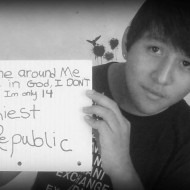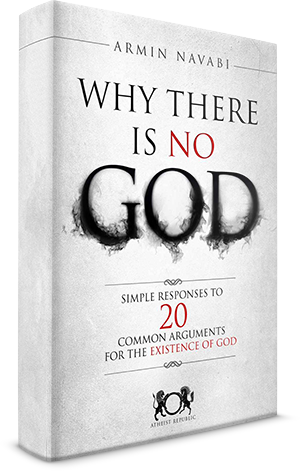Is it unreasonable to believe in a Creator?
Donating = Loving
![]()
Bringing you atheist articles and building active godless communities takes hundreds of hours and resources each month. If you find any joy or stimulation at Atheist Republic, please consider becoming a Supporting Member with a recurring monthly donation of your choosing, between a cup of tea and a good dinner.
Log in or create an account to join the discussions on the Atheist Republic forums.




























Why don't you get to your point, Gerry? Your set up is tedious and pretty obvious.
2. In many cases where the origin of a thing is unknown and/or disputed, the thing nevertheless bears all the usual hallmarks of somebody dreaming it up and making it happen. Agreed?
When I see billions of people die of hunger I do not see the "usual hallmarks of somebody dreaming it up".
eg: a loving god that dreamed it up to make it happen.
When I see an unknown like a black hole, I do not see any "hallmarks" of somebody dreaming it up either.
Can you please stop sprouting nonsense?
Jeff Vella Leone: Man, you are incredibly stupid, which part of the word DRUNK did you miss.
Gerry: As I understand it, Ernest Hemingway did some of his best creative work while drunk.
Jeff Vella Leone: I was drunk and didn't even know I hit you.
Gerry: Don't remember, I think, is more accurate.
Jeff Vella Leone: I did not dream it.
Gerry: I don't think dreams have been mentioned before in this connection.
Jeff Vella Leone: I did not even know you were there.
Gerry: You must have been aiming at something.
Jeff Vella Leone: You are assuming that accidents are all thought of beforehand in out head.
Gerry: Not at all. That's why we call some things "accidents" and other things "willful acts" and other things "creative acts", etc. In my propositions, "things" refers to physical things.
Jeff Vella Leone: You are also assuming that our actions and effects of our actions are all thought of in advance.
Gerry: No, I'm saying that human artifacts that looked designed typically are designed.
Jeff Vella Leone: If i spill my coffee by accident you are claiming that I thought of it beforehand.
Gerry: Spilling coffee isn't typically a creative act, and thus doesn't require design and purpose. It may, of course, if the act is willful. But when you say "by accident" you place the event (and its results) outside the scope of this thread.
In any case, it's a moot question since I've revised my major premise to read as follows:
1. In MANY CASES where the origin of a thing is known and undisputed, somebody dreamed it up and made it happen.
And since others have agreed with that, I've added my minor premise:
2. In many cases where the origin of a thing is unknown and/or disputed, the thing nevertheless bears all the usual hallmarks of somebody dreaming it up and making it happen.
Zaphod says: I would say sure in many cases...
Gerry: I'm not sure if you're agreeing with my point #1, my point #2, or both.
Zaphod says: ...but I am willing to bet there are billions if not trillions and trillions more cases where things with unknown origin that bear no hallmarks of someone dreaming it up or making it happen. The universe is quite big there is a heck of a lot of unknown in it. heck even the earth is quite big and there is a heck of a lot of unknown on it.
Gerry: I don't think that's true, but either way, it doesn't affect my argument.
CyberLN says: Why don't you get to your point, Gerry?
Gerry: It's easier to reach agreement with others when one approaches things step by step, getting agreement at each stage. If nothing else, it helps to clarify the terms being used.
CyberLN says: Your set up is tedious
Gerry: I'm sorry you find it so.
CyberLN says: ...and pretty obvious.
Gerry: And here I thought it was the propositions that were obvious!
Gerry: You must have been aiming at something.
I might have been moving my hand randomly because i was drunk too.
you are assuming a lot of things.
origin of a thing is known and undisputed"
the origine for your black eye is my fist, it is know and undisputed.
I did not "dreamed it up and made it happen."
"Gerry: I don't think dreams have been mentioned before in this connection."
You mentioned dreams first remember?
"Jeff: You are assuming that accidents are all thought of beforehand in out head."
Gerry: Not at all. That's why we call some things "accidents" and other things "willful acts" and other things "creative acts", etc. In my propositions, "things" refers to physical things.
yes you are with:
"1. In MANY CASES where the origin of a thing is known and undisputed, somebody dreamed it up and made it happen."
A lot of things we experience happen without us thinking about it beforehand, like sudden rain, accidents, unexpected actions of others that effect us.(90% of life goes here)
We are constantly learning new things, they are mostly not thought of beforehand.
There are so many unknowns in life that one could say that he can never learn enough.
So your premise should be
1. In VERY FEW CASES where the origin of a thing is known and undisputed, somebody dreamed it up and made it happen.
Gerry: I don't claim to know that is the case in any provable sense-
So you hold a belief on faith aka pretending to know what you can't know. Until it is demonstrable Gerry there is nothing to confirm or deny.
Jeff Vella Leone: When I see billions of people die of hunger I do not see the "usual hallmarks of somebody dreaming it up".
eg: a loving god that dreamed it up to make it happen. When I see an unknown like a black hole, I do not see any "hallmarks" of somebody dreaming it up either.
Gerry: Non sequitur.
Jeff Vella Leone: Can you please stop sprouting nonsense?
Gerry: You are free, of course, to ignore this thread if you wish. But I don't think my propositions are nonsense. Nor do I think my conclusion is nonsense. Perhaps if I restate the thing in simpler terms it will help. Here's the general form suggested previously by another poster:
Major Premise: Many apples are red.
Minor Premise: John has an apple.
Conclusion: It is not unreasonable to believe that John's apple may be red.
And here's the argument:
Major Premise: Many things that appear to be designed, actually are.
Minor Premise: Many things in nature appear to be designed.
Conclusion: It is not unreasonable to believe that some things in nature may be designed.
A valid syllogism, yes?
Ellie Harris: So you hold a belief on faith aka pretending to know what you can't know.
Gerry: No, I act on my beliefs (as we all must do); but I don't pretend that my beliefs are infallible.
Ellie Harris: Until it is demonstrable Gerry there is nothing to confirm or deny.
Gerry: Not sure what "it" refers to in that sentence. But there IS something here to confirm or deny. It's the following argument: either it's a valid syllogism, or it's not. This is the form (with "many" now replaced with "some" to meet Mr. Vella Leone half-way):
Major Premise: Some apples are red.
Minor Premise: John has an apple.
Conclusion: It is not unreasonable to believe that John's apple may be red.
And this is the argument:
Major Premise: Some things that appear to be designed, actually are.
Minor Premise: Some things in nature appear to be designed.
Conclusion: It is not unreasonable to believe that some things in nature may be designed.
A valid syllogism, yes?
For me your first argument is a generalization of something which was incorrect.
This update is a more of a twist on someone else, a more correct idea of what you wished to imply originally(maybe).
"Major Premise: Many apples are red.
Minor Premise: John has an apple.
Conclusion: It is not unreasonable to believe that John's apple may be red."
Here we are talking about the probability of it beeing red.
The point here is that even though the probability of it being a red apple is higher, it does not mean that John will have a red apple.
this is not saying the same thing:
1. In MANY CASES where the origin of a thing is known and undisputed, somebody dreamed it up and made it happen.
Here you are saying that in those many case where "the origin of a thing is known and undisputed", people thought of it beforehand.
Which is not true.
There are much more things in life which we know their origin and when they happen in life, they happen by accident or without thinking about them most of the time.
Breathing oxygen is done by our brain without us thinking about it.
We do not have control over 90% of our own body.
You are wrong, from those things that we know the origin of, there are only few things which we "dreamed it up and made it happen."
We have different reasoning and it differs from one person to another so whether it's reasonable for some or not, it really depends.
Jeff Vella Leone: For me your first argument is a generalization of something which was incorrect.
Gerry: Moot. The first argument is gone.
Jeff Vella Leone: This update is a more of a twist on someone else, a more correct idea of what you wished to imply originally (maybe).
Gerry: I sure hope so.
Jeff Vella Leone:
"Major Premise: Many apples are red.
Minor Premise: John has an apple.
Conclusion: It is not unreasonable to believe that John's apple may be red."
Here we are talking about the probability of it being red. The point here is that even though the probability of it being a red apple is higher, it does not mean that John will have a red apple.
Gerry: Agreed. But of course the conclusion doesn't say anything about probabilities, and it certainly doesn't say, "John WILL have a red apple." It simply says, "It is not unreasonable to believe that John's apple may be red." If you prefer, I can shorten it to, "John's apple may be red."
Jeff Vella Leone: this is not saying the same thing...
Gerry: Moot. The argument now under discussion is this:
Major Premise: Some things that appear to be designed, actually are.
Minor Premise: Some things in nature appear to be designed.
Conclusion: It is not unreasonable to believe that some things in nature may be designed.
If you like, we can shorten the conclusion to read, "Some things in nature may be designed."
Either way, valid syllogism, yes?
mysticrose: We have different reasoning and it differs from one person to another so whether it's reasonable for some or not, it really depends.
Gerry: Let me remove the word from the argument, then. Here's the simplified form:
Major Premise: Some things that appear to be designed, actually are.
Minor Premise: Some things in nature appear to be designed.
Conclusion: Some things in nature may be designed.
And here are the same premises with a different conclusion:
Major Premise: Some things that appear to be designed, actually are.
Minor Premise: Some things in nature appear to be designed.
Conclusion: Nothing in nature is designed.
Which conclusion seems more "reasonable" to you?
Well, so be honest and admit that your OP was wrong and THEN we can argue new arguments.
"Major Premise: Some things that appear to be designed, actually are.
Minor Premise: Some things in nature appear to be designed.
Conclusion: It is not unreasonable to believe that some things in nature may be designed.
If you like, we can shorten the conclusion to read, "Some things in nature may be designed."
Here you are assuming that those things "in nature" are a product of Nature itself.
This is an other assumption you seem to imply when you say:
"Some things in nature may be designed."
If I throw a genetically modified cow in nature, you cannot say that it comes from nature even if you found it there.
In conclusion to what I think your claim is:
"It is not unreasonable to believe that some things" FOUND "in nature may be designed."
Yes if you found something which does not fit the natural order of things in nature you can say it was designed.
when I say, "you can say it was designed."
I mean you can claim it was designed.
Jeff Vella Leone: Well, so be honest and admit that your OP was wrong and THEN we can argue new arguments.
Gerry: My first post was wrong in a number of different ways.
Jeff Vella Leone: ...if you found something which does not fit the natural order of things in nature you can say it was designed.
Gerry: How can we tell whether something "does not fit the natural order of things in nature"?
well it varies on our current understanding of nature.
If you found a 'Fridge' in the midde of a forest and you never seen one before but are an expert of natural habitats.
You can come to the conclusion that this squarish metal/plastic object does not fit well with that particular habitat.
Not only in shape but also in it's material.
It rusts and losses color or breaks with the sun heat.
So the 'fridge' is alien to that particular environment.
It might be designed or it might be coming from an other natural environment the person does not know of.
Then when someone from the city comes and sees the fridge, he recognizes it because his knowledge of today's technology allows him to understand what it is and make a better decision.
Which is that it does not come from an other environment naturally but it was designed by an advanced species we call humans.
Jeff Vella Leone: ...well it varies on our current understanding of nature. If you found a 'Fridge' in the midde of a forest and you never seen one before but are an expert of natural habitats. You can come to the conclusion that this squarish metal/plastic object does not fit well with that particular habitat...
Gerry: I was hoping for rules rather than examples, but that will do for now. Let me ask you this: I write a program that draws landscapes with some degree of autonomy. For example, I allow the program to decide how many birds to put in each picture, and where to put them, so the output is only predictable in a very general sense. Now obviously, the program is the result design; it's a human artifact. But what about the drawings? Are they also the result of design, human artifacts "once removed", so to speak? Or are they more like "naturally occurring" objects?
There are things that are products of designed artifacts which appear random or even ""naturally occurring" objects".
This is where design and nature come one, Nature has a method of replicating things to create living organisms.
The computer is just mimicking that aspect.
Eg: If i spill my hot chocolate on the white floor it might make a shape of something.
Even if the hot chocolate is designed and so is the withe floor, it doesn't mean that the shape formed on the floor was designed.
It does not mean it was random either.
If we have all the knowledge of all the forces acting on that spilled chocolate we would be able to predict the exact shape it would make at the end.
We simply do not have enough knowledge on most subjects to yet be able to predict everything.
Your computer generated world is an other example of us not having enough knowledge on the end result of the program itself.
(since u let them with some degree of autonomy and without recording their actions and decisions)
so yes one could say they are "naturally occurring" objects since you created the nature for them and left it to do its course.
Jeff Vella Leone: ...so yes one could say [the drawings produced by a semi-autonomous program] are "naturally occurring" objects since you created the nature for them and left it to do its course.
Gerry: Okay, so I look back to the beginning of my little "drawing" universe and I see, in order: (1) the concept in my head; (2) the physical implementation of the thing; and (3) the drawing universe "evolving" on it's own (within the limits I set). And I understand that sequence; it's simple, familiar, practical, and really has only one paradigm in it: design->create->run. And I think to myself, maybe that's how the actual universe came to be. Seems reasonable, especially when I consider the popular alternative (where something mysterious like a singularity mysteriously explodes into a lifeless universe which mysteriously produces life which is then mysteriously mutated and selected into beings who (surprise!) do almost everything in accord with the design->create->run paradigm).
See my problem? My picture has only one serious mystery in it: where did the original Designer come from? While the other picture is a riddle wrapped in a mystery inside an enigma that can only be investigated by employing the design->create->run paradigm that the whole rest of the system emphatically disallows. If only Occam were here to help us choose!
You are assuming a lot of things.
First you are comparing a simple program to the complexity of reality.
Where the program is a limited version of reality that WE understand.
You are simplifying the reality we live in too much, to the point that you lost most of the details.
First assumption:
The program has a beginning while the universe might not have.
Second assumption:
You are assuming design in the universe but have given no evidence of such.
We have been debating about the RUN here all along, we never talked about the Design.
Third assumption;
"singularity mysteriously explodes into a lifeless universe"
what makes you thing that that the explosion happened once?
what makes you think it is lifeless?
what do you consider as life? Is bacteria created in the vacuum life for you?
Forth assumption:
"where did the original Designer come from? "
Is there the need of a designer for something which is infinite or was always there?
Since you are completely excluding that possibility.
We know that energy cannot be created or destroyed.
So there is evidence that the infinite nature of energy in the vacuum might very well not have a beginning or a creator and was just always there.
Jeff Vella Leone: You are assuming a lot of things.
Gerry: Agreed.
Jeff Vella Leone: First you are comparing a simple program to the complexity of reality.
Gerry: Agreed.
Jeff Vella Leone: Where the program is a limited version of reality that WE understand.
Gerry: Agreed.
Jeff Vella Leone: You are simplifying the reality we live in too much, to the point that you lost most of the details.
Gerry: I don't think the details are critical at this level of argument.
Jeff Vella Leone: First assumption: The program has a beginning while the universe might not have.
Gerry: Right, we don't know. But I think it did for a variety of reasons (like, since entropy is always increasing, if the universe didn't have a beginning it would have reached maximum entropy by now). It's a guess.
Jeff Vella Leone: Second assumption: You are assuming design in the universe but have given no evidence of such.
Gerry: No evidence that you find compelling, perhaps. Others, including me, see evidences of design everywhere we look. Maybe you just don't have eyes to see it.
Jeff Vella Leone: We have been debating about the RUN here all along, we never talked about the Design.
Gerry: Perhaps haven't talked explicitly about it, but it's been implied throughout: my posts, for example, were designed; my syllogisms were designed; my program was designed; your responses to me were designed. Goodness! Design everywhere we look. And in everything we do. How could the whole universe -- and us! -- happen without design?
Jeff Vella Leone: Third assumption: "singularity mysteriously explodes into a lifeless universe" what makes you thing that that the explosion happened once?
Gerry: Just the story I've been told by the "experts".
Jeff Vella Leone: what makes you think it is lifeless?
Gerry: Again, that's what I've been told by the "experts".
Jeff Vella Leone: what do you consider as life?
Gerry: Recognizing life is one thing; defining it quite another. Life is stuff that is not dead. If I had to venture a definition I'd say something like "life is that which actively opposes the second law of thermodynamics".
Jeff Vella Leone: Is bacteria created in the vacuum life for you?
Gerry: Yes, I'd say so.
Jeff Vella Leone: Forth assumption: "where did the original Designer come from? "
Gerry: I'm going to go with "always was"; "I AM THAT I AM".
Jeff Vella Leone: Is there the need of a designer for something which is infinite or was always there? Since you are completely excluding that possibility.
Gerry: I'm not excluding any possibilities; I'm simply postulating certain ideas for the sake of further reasoning. I have no doubt that others can and will and do postulate other things at the base of their rational structures.
Jeff Vella Leone: We know that energy cannot be created or destroyed.
Gerry: No, we THINK that energy cannot be created or destroyed.
Jeff Vella Leone: So there is evidence that the infinite nature of energy in the vacuum might very well not have a beginning or a creator and was just always there.
Gerry: I still have a problem with getting a greater out of a lesser; you can't (in my view) get personality (for example) out of something that is impersonal; etc. So whatever was "always there" has to have all the attributes, at least in potential, that the resulting universe has. Which is a thing that is commonly known, not as "energy in a vacuum", but God.
Gerry: So whatever was "always there" has to have all the attributes, at least in potential, that the resulting universe has.
This is an interesting line of argument, but I don't think you will like where it leads. To make your argument a bit more rigorous:
There are several conserved quantities in nature: energy, electric charge, angular momentum for example. There is a non-zero probability for any system to evolve into any other system that shares the exact same conserved quantities. There is zero chance for any system to evolve into a different system that does not have the same exact conserved quantities. In short, the allowed outcomes are outcomes that conserve these quantities, and the forbidden outcomes are the outcomes that do not conserve these quantities. Now if we start with the state of "nothing":
State of Nothing:
total energy = 0
total electric charge = 0
total angular momentum = 0
If you can show that the conserved quantities of the current universe are not 0, then the universe must have an outside source (this would be a great place to shoehorn in your god except there is a problem: our universe appears to share the same values as "nothingness". Does this mean the universe came from nothing? No.! There will always be room to shoehorn god into any creation narrative. But it does beg the question: "If God is real, why did he choose to make the universe APPEAR to have come from nothing?"
The same question could be made for the skeptics of biological evolution: "If god is real, and biological evolution is false, why did god go to all the trouble to make it APPEAR that biological evolution took place?"
I've never gotten a believer to give me a straight forward answer to those 2 questions. Maybe you will be the first.
All your replies are evasive of the holes in your logic.
I asked the questions just to show how improbable your claim was since it is based on so many assumption. Instead you answered them in a way to show that there is a way that the assumptions could be possible.(which was not the argument)
Meaning you did not even understand why I was asking those questions.
It seems I am wasting my time here.
Just so you know, your answers are wrong on many levels but i have no time to debate them since they open on many topics.
I will stick to the last point:
"get personality (for example) out of something that is impersonal"
What makes you think that this cannot happen naturally?
Many thought something similar when they told them that a vegetarian, black and white bear exists.
Nature is full of surprises we don't expect.
Nyarlathotep: If God is real, why did he choose to make the universe APPEAR to have come from nothing?
Gerry: I realize my answer will disappoint you, but I've not obvious to me that "the universe appears to have come from nothing". I have no experience with creation ex nihlio (creation out of nothing) and no one else (as far as I know) does either. In short, such a thing is INCONCEIVABLE -- ie, impossible for us to picture. Hence, asserting that something like that happened (as theologians often do) is, in my mind, asserting we-know-not-what. And saying that "the universe appears to have come from nothing" isn't far behind.
Nyarlathotep: If god is real, and biological evolution is false, why did god go to all the trouble to make it APPEAR that biological evolution took place?
Gerry: Again, your premise is foreign to me. I don't see the evidence for biological evolution that some do; it all seems very sketchy and tentative and biased to me. Sorry.
Gerry: Again, your premise is foreign to me. I don't see the evidence for biological evolution that some do; it all seems very sketchy and tentative and biased to me. Sorry.
Failure to see the possibility of creation ex nihilo is understandable. It is not obvious and not a simple subject. I am much more disturbed by your failure to understand biological evolution. This subject is extremely accessible, does not require special training, and is open to anyone who is interested. You have chosen to be willfully ignorant, so again you have created a tautology. Of course you have no seen any evidence for biological evolution, you have refused to look.
Jeff Vella Leone: ...you did not even understand why I was asking those questions.
Gerry: Seems so.
Jeff Vella Leone: It seems I am wasting my time here. Just so you know, your answers are wrong on many levels but i have no time to debate them since they open on many topics. I will stick to the last point: "get personality (for example) out of something that is impersonal" What makes you think that this cannot happen naturally? Many thought something similar when they told them that a vegetarian, black and white bear exists.Nature is full of surprises we don't expect.
Gerry: Vegetarian black and white bears are a mere variation on a theme; whether one can get more out of a thing that is there in the first place is a fundamental question of principle.
Don't you think you are arrogant in thinking what can or what cannot come from nature?
Given so many unknowns involved any kind of conclusion derived from what can or what cannot came from nature is at beast a possibility.
if your entire argument hinges of the idea that "personality " cannot come from nature, your argument is weak.
It is not based on evidence but your personal opinion which might be possible but might not.
Jeff Vella Leone: Don't you think you are arrogant in thinking what can or what cannot come from nature?
Gerry: I think it would be arrogant if I were insisting that my views were infallible; I'm not. I'm just saying how things strike me. I've never seen something come from nothing; I've never seen somebody get more out of something than was there in the first place. And I can't even imagine how to simulate such things to experiment. So, from my point of view, and from my experience, I have to say some things just don't seem possible.
Jeff Vella Leone: Given so many unknowns involved any kind of conclusion derived from what can or what cannot came from nature is at beast a possibility.
Gerry: Agreed. Though some things seem much more likely that others, and some explanations are much simpler than others.
Jeff Vella Leone: if your entire argument hinges of the idea that "personality " cannot come from nature, your argument is weak.
Gerry: My argument is more general than that. We KNOW that complex, functional, practical things can come from intelligent design with a specific purpose in mind; that's experience that everyone has. We don't know if such things can come from random mutations and a non-intelligent selection mechanism; that's a theory at best.
Jeff Vella Leone:It is not based on evidence but your personal opinion which might be possible but might not.
Gerry: No, my point of view IS based on evidence, the evidence just given: that the one view has the support of the experience of humans everywhere, the other doesn't.
Crap this was a long argument, and I'm too tired to read it all so I'm sorry if I'm making a point that was already made.
The natural universe is in a specific state at any given time regardless of what mankind knows about it. When man thought the world was flat the world was actually round. There does not need to be a vision of any kind by man for the universe to behave a certain way. We understand the universe not because we vision it but because we observe it.
Like with Schrodinger's cat hypothesis, the cat is both alive and dead if no one ever looks into the box. This is man's vision. Both may be true so neither may be dismissed. Either way the cat IS either alive or dead and man does not need to observe it for it to be true.
Your statement about something having an origin because someone had a vision of it may mean that 1. there is a god because people can invision it or 2. That the universe only exists because god had a vision of it.
With regards to a god, there either is a god or there is not a god regardless of human belief, because human belief does not affect the universe around us.
With regards to the universe existing because there must have been a vision of it... It is fathomable for there to have been a god who created everything from nothing, but there is no reason to belief that because there have been no observations of something being created from nothing. i.e. stars from from nebulae of gas and neither stars not nebulae have been observed to spontaneously be created. (If you would like to quote that the big bang is evidence of something coming from nothing [the farthest observation we have made into the origin of the universe is much smaller than a microsecond after the universe began expanding, so we have never made an observation of matter being created out of nothing and there may be another hypothesis on how the matter got to where it was])
Summary: There could be a god as much as there could not be a god but it is outside of our control and observation. The universe is how it is and our visions must fall into the scheme of the universe in order for them to be plausible. (even then our visions may not be correct)
Pages